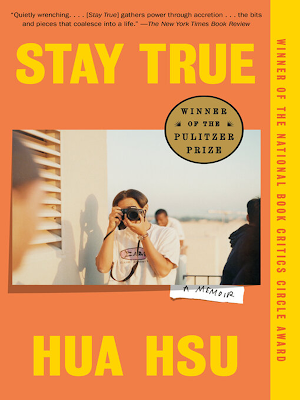Stay True is an autobiography by Hua Hsu anchored by his friendship with his college friend Ken and its effect on his life.
This book contains a myriad of Gen X nostalgia bait that certainly caused me to reminisce about the 90s and early 2000s
I probably spent more time making the mixtape than it took to drive to the house and back .
Cameras felt intrusive to everyday life . It was weird to walk around with one , unless you worked for the school paper , which made picture taking seem a little less creepy
spontaneous , you still fussed and awkwardly posed , because there was a finality to it ,
There are four themes that I take away from this book
- His relationship with his Dad during his formative years as a teenager
- His approach to making friends as life stabilizes in college
- His exposure to various philosophies and ideologies
- His friendship with Ken and how it defined him
Wiseness of his Dad
“model minority.” In fact, they hadn’t even planned on becoming Americans. They simply didn’t know such identities were available to them. Their allegiances remained to the world they had left behind.
His Dad’s advice to Hua in various instances of this young life moved me.
When his Dad moved to Taiwan, Hua and his Dad kept in touch via fax. In one such exchange, his Dad made some sage remarks on his son’s claim that his generation was lost.
That’s the dilemma of life: you have to find meaning, but by the same time, you have to accept the reality. How to handle the contradiction is a challenge to everyone of us. What do you think?
But don’t paint the generation with stereotype such as “lost.” I think that’s true for all generations during a certain period of their life.
On Making Friends
I liked his writing style—the following line, for example, beautifully lays out his strategy for making friends at college.
There were people in our dorm I wanted to befriend, where the inertia of proximity, I was certain, would one day result in closeness.
The author starts to describe how he and Ken develop a friendship. Ken is outspoken and outgoing, yet he knows how to read each person, when to hang back, and when to prod.
The author has this anti-establishment mentality. In late high school and college, he believes that whatever is mainstream isn’t cool. If everyone is doing it, it must be uncool.
I didn’t trust anyone who tucked their shirts in.
He wants to represent a counterculture, yet I don’t think he has any solid idea of what that represents.
I like how the author describes how friendships are transactional asynchronously. There is a gap between transactions, and friendships develop in these gaps.
Friendship rests on the presumption of reciprocity, of drifting in and out of one another’s lives, with occasional moments of wild intensity.
Philosophies
The book certainly has portions dedicated to the author’s exploration of various philosophical ideologies.
In one chapter, there is an exploration of dichotomies and the emerging philosophists at the time.
It was hard to unlearn the usefulness of dichotomies. They made the world so much cleaner. I had defined myself by what I rejected, and these choices often hardened into something that felt political.
At one point, Hua is also interested in the Black Panthers and interestingly notes how his parents remained un-involved with the social movements in America.
Hua also learns about “authenticity.”
Taylor called this authenticity, and it became the unreachable horizon of modern life.
Lastly, I liked Ken and Hua’s in-depth sleepover discussion of the movie “The Last Dragon” and how it relates to authenticity -
The Last Dragon was a commentary on authenticity, the porousness of identity, the joyful, postmodern possibilities of mixing and matching Asian and Black cultures! Maybe it wasn’t, but we stayed up well into morning dissecting it as though it held the key to our world.
Ken’s Death
The murder of Ken was so senseless. I didn’t anticipate it.
Hua describes it as a generally happy day - a housewarming party that signaled their maturing into adulthood, a rave that he and his girlfriend attended, and the night when he and his girlfriend finally got serious.
If anything, the senselessness and untimeliness of Ken’s murder caused me to self-reflect on the nature of my existence. I am here one day but could be gone another.
In the days and months following Ken’s death, it is clear that Hua was deeply emotionally attached to Ken. He cannot seem to talk about Ken to anyone he meets. It almost seems like he is trying to keep his memory alive while others have started to move on.
It takes him therapy in Graduate School to process all these emotions and finally start to heal.

